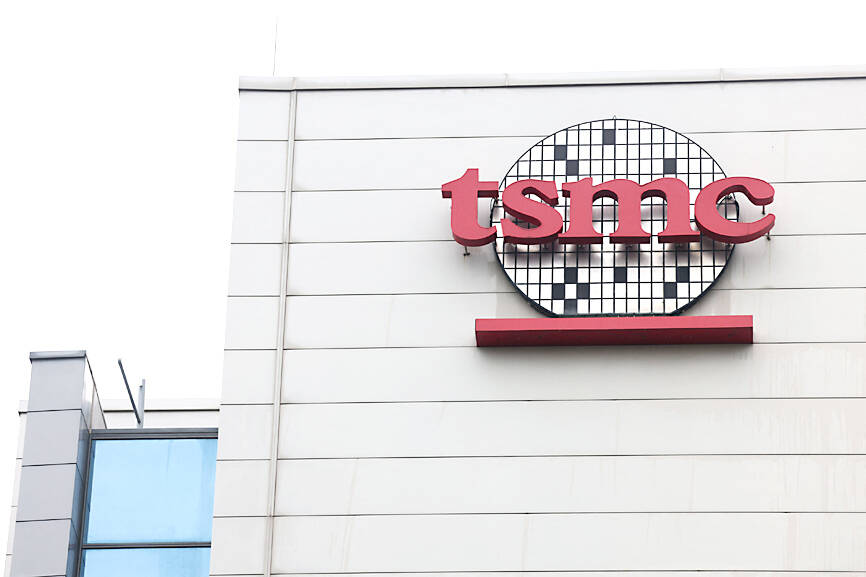Taiwan Semiconductor Manufacturing Co (TSMC, 台積電) is expected to grow its revenue by about 25 percent to a new record high next year, driven by robust demand for advanced technologies used in artificial intelligence (AI) applications and crypto mining, International Data Corp (IDC) said yesterday.
That would see TSMC secure a 67 percent share of the world’s foundry market next year, from 64 percent this year, IDC senior semiconductor research manager Galen Zeng (曾冠瑋) predicted. In the broader foundry definition, TSMC would see its market share rise to 36 percent next year from 33 percent this year, he said.
To address concerns about its market dominance, TSMC in July created a new definition of the foundry market, called Foundry 2.0, which includes chip packaging, testing, mask making and all integrated device manufacturers (IDM) such as Intel Corp, but excludes memorychip makers.

Photo: Cheng I-hwa, AFP
“TSMC will continue to dominate the foundry market either by the definition of Foundry 1.0 or Foundry 2.0,” Zeng said.
TSMC, the world’s biggest contract chipmaker, is fast-tracking production of 3-nanometer, 4-nanometer and 5-nanometer chips to catch up with customers’ demand by performing “super-hot-run” production cycle, the shortest production cycle adopted for rush orders, Zeng said, adding that the utilization rate of those technology nodes stood at more than 95 percent.
The Hsinchu-based chipmaker is to add 70,000 advanced wafers a month next year to existing capacity for 2-nanometer, 3-nanometer, 4-nanometer and 5-nanometer chips, he said.
TSMC is also expected to double its capacity of advanced packaging technology, or chip-on-wafer-on-silicon (CoWoS), mostly used in AI chips for Nvidia Corp, to 660,000 units next year, from 330,000 units this year, Zeng said.
Even so, its CoWoS capacity would remain insufficient next year, he said.
IDC also projects the world’s semiconductor industry would expand 15 percent in production value to US$782 billion, while the global foundry segment would grow 20 percent next year, he said.
Samsung Electronics Inc is expected to ramp up production of 2-nanometer technology next year, IDC said. Samsung’s move would be earlier than TSMC by half to one quarter, but the company has to address the issue of its low yield rate, it said.
TSMC is expected to enter volume production of 2-nanometer technology in the second half of next year, with a small volume shipped to Apple Inc at the end of the year or early 2026, IDC said.

TARIFFS: The global ‘panic atmosphere remains strong,’ and foreign investors have continued to sell their holdings since the start of the year, the Ministry of Finance said The government yesterday authorized the activation of its NT$500 billion (US$15.15 billion) National Stabilization Fund (NSF) to prop up the local stock market after two days of sharp falls in reaction to US President Donald Trump’s new import tariffs. The Ministry of Finance said in a statement after the market close that the steering committee of the fund had been given the go-ahead to intervene in the market to bolster Taiwanese shares in a time of crisis. The fund has been authorized to use its assets “to carry out market stabilization tasks as appropriate to maintain the stability of Taiwan’s

STEEP DECLINE: Yesterday’s drop was the third-steepest in its history, the steepest being Monday’s drop in the wake of the tariff announcement on Wednesday last week Taiwanese stocks continued their heavy sell-off yesterday, as concerns over US tariffs and unwinding of leveraged bets weighed on the market. The benchmark TAIEX plunged 1,068.19 points, or 5.79 percent, to 17,391.76, notching the biggest drop among Asian peers as it hit a 15-month low. The decline came even after the government on late Tuesday authorized the NT$500 billion (US$15.2 billion) National Stabilization Fund (國安基金) to step in to buoy the market amid investors’ worries over tariffs imposed by US President Donald Trump. Yesterday’s decline was the third-steepest in its history, trailing only the declines of 2,065.87 points on Monday and

TARIFF CONCERNS: The chipmaker cited global uncertainty from US tariffs and a weakening economic outlook, but said its Singapore expansion remains on track Vanguard International Semiconductor Corp (世界先進), a foundry service provider specializing in producing power management and display driver chips, yesterday withdrew its full-year revenue projection of moderate growth for this year, as escalating US tariff tensions raised uncertainty and concern about a potential economic recession. The Hsinchu-based chipmaker in February said revenues this year would grow mildly from last year based on improving supply chain inventory levels and market demand. At the time, it also anticipated gradual quarter revenue growth. However, the US’ sweeping tariff policy has upended the industry’s supply chains and weakened economic prospects for the world economy, it said. “Now

An employment discrimination lawsuit against contract chipmaker Taiwan Semiconductor Manufacturing Co (TSMC, 台積電) might soon be expanded after a hearing in a federal court in San Jose, California, on Tuesday to add 15 plaintiffs to the case. According to a court document, the lawsuit, which was refiled in November last year as a form of a class action with 13 plaintiffs in California, wants to add 15 plaintiffs from Arizona, where TSMC is building up its wafer fab capacity. TSMC first committed between 2020 and last year to invest US$65 billion in three advanced wafer fabs in Arizona. It then pledged an